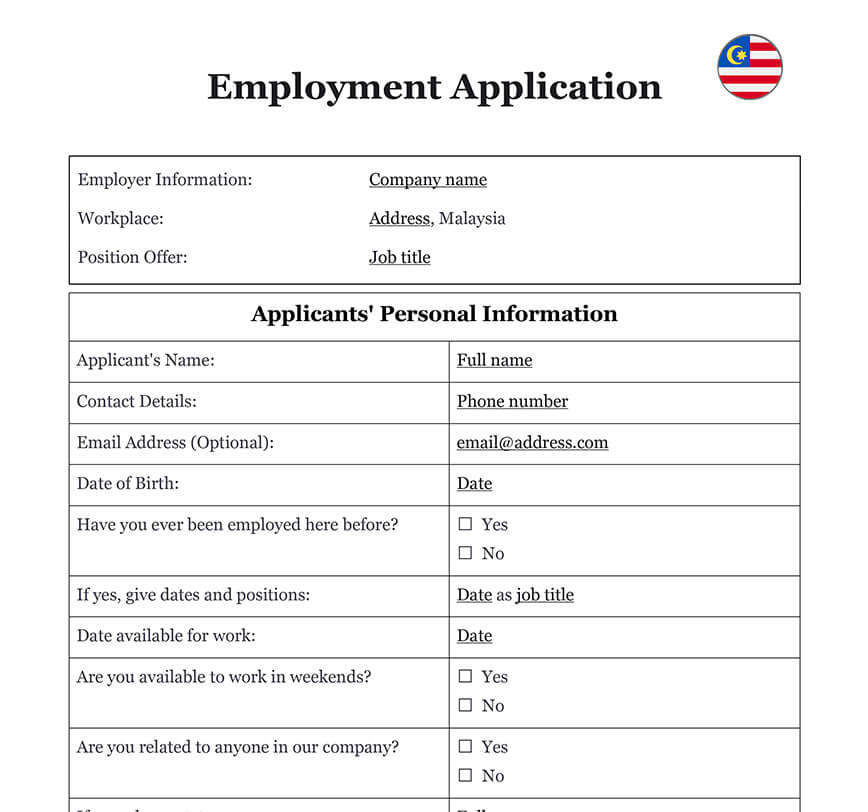Ready to use legal template
Work on without any hassle
Compliant with Hong Kong law
Ready to use legal template
Work on without any hassle
Compliant with Hong Kong law
Learn more about Employment Application in Hong Kong
An Employment Application is a formal document used by employers to collect essential information from job applicants, including personal details, work experience, qualifications, and references. This form ensures a structured hiring process, allowing businesses to assess candidates efficiently while maintaining compliance with Hong Kong’s labor laws. A well-drafted Employment Application helps protect employers by establishing clear terms regarding the accuracy of information provided, preventing potential disputes. It also supports fair hiring practices by standardizing applicant evaluation. At Themis Partner, our Employment Application template is professionally drafted to meet Hong Kong’s legal standards and is fully customizable to fit your company’s needs. Download our easy-to-edit Word document today to streamline your recruitment process with confidence.
Table of contents
-
What is an Employment Application in Hong Kong?
-
What is included in this Employment Application?
-
Are there restrictions on asking for salary history?
-
Can an employer ask for personal data in a Job Application Form?
-
What is the difference between an Employment Application and Contract?
-
What personal data protection laws apply to a Job Application Form?
-
Can an employer reject a candidate based on the Job Application Form?
-
How long should employers keep Employment Application records?
-
What are the best practices for screening Employment Applications?
What is an Employment Application in Hong Kong?
An Employment Application in Hong Kong is a standardized form used by employers to collect essential information from job applicants during the recruitment process. This form serves as an initial screening tool, helping employers assess whether a candidate meets the qualifications and suitability for a given role. The document typically includes sections on the applicant’s personal details, employment and education history, and declarations regarding background checks. Beyond its administrative purpose, the Employment Application form also plays a vital legal role: it ensures that information is collected lawfully, fairly, and in accordance with Hong Kong’s Personal Data (Privacy) Ordinance (PDPO). Employers rely on this form to streamline the hiring process, reduce bias, and demonstrate compliance with employment laws.
What is included in this Employment Application?
A professionally drafted Employment Application in Hong Kong includes several key clauses that provide a structured and legally sound method for gathering candidate information:
| ➤ Employer Information: Name of employer or company, business registration number, workplace address in Hong Kong, and position applied for. |
| ➤ Applicant’s Personal Information: Full legal name, address, contact details, HKID or passport number, interview availability, and expected start date. |
| ➤ Employment History: Chronological list of past jobs with titles, employer names and addresses, employment dates, and reasons for leaving. |
| ➤ Education Background: Academic qualifications including schools attended, programs completed, and graduation dates. |
| ➤ Criminal Record Declaration: Disclosure of any criminal convictions, noting that spent convictions (over 3 years old) may not need to be disclosed unless legally required. |
| ➤ Availability for Work: Earliest start date, preferred working hours, and willingness to work weekends or public holidays if applicable. |
| ➤ Employment with the Company: Details of any previous employment with the company, including internships or part-time roles. |
| ➤ Family Relationship Disclosure: Declaration of relatives working in the company, including names and relationships, to avoid conflicts of interest. |
| ➤ Reference Checks: Contact details of at least two referees and consent for the employer to verify work history and performance. |
| ➤ Declaration and Consent: Confirmation of accuracy of information and authorization for background checks in compliance with privacy laws. |
Are there restrictions on asking for salary history?
1. Salary History and Fair Pay Practices in Hong Kong
In Hong Kong, while employers are not legally prohibited from asking about an applicant’s salary history, doing so is discouraged as part of efforts to promote fair pay and minimize wage inequality. In particular, relying on past salaries can lead to unfair compensation practices, which may disproportionately affect women and minority groups. Ethical employers are shifting towards asking applicants about their salary expectations instead of focusing on historical salary data. This approach helps prevent perpetuating historical pay disparities and promotes a fairer hiring process.
1. Salary and Compensation
Under Hong Kong’s Personal Data (Privacy) Ordinance, employers must collect personal information, including salary history, only for lawful recruitment purposes. The data requested must be relevant and not excessive to protect applicants’ privacy rights. Employers are required to handle this information responsibly and securely. This legal framework prevents unnecessary invasions of privacy during hiring. It ensures transparency and fairness throughout the recruitment process. Applicants have the right to know how their data will be used. Employers must also obtain consent before collecting personal data. Compliance promotes trust between employers and candidates. For further information on the personal data protection requirements, visit the Office of the Privacy Commissioner for Personal Data.
Can an employer ask for personal data in a Job Application Form?
1. Data Collection Guidelines for Employers
In Hong Kong, employers may collect personal data from job applicants only if it is relevant to recruitment. Commonly collected information includes name, contact details, education, and work history. Employers must clearly inform applicants about the purpose of data collection and how their information will be used. They must also disclose if the data will be shared with third parties. This transparency is required under the Personal Data (Privacy) Ordinance. The law ensures that applicants’ personal information is handled responsibly and securely. It protects candidates from misuse of their data. Employers must obtain consent before collecting any personal information. Compliance fosters trust and fairness in hiring practices.
2. Compliance with Privacy Laws
Employers must be careful not to collect excessive or irrelevant data during the hiring process. The Personal Data (Privacy) Ordinance mandates that employers obtain consent from candidates before conducting any background checks or reference verifications. Additionally, any personal data collected must be stored securely and disposed of appropriately once the recruitment process is complete, especially if the candidate is not hired. Employers must follow these regulations to avoid potential violations and safeguard candidates’ privacy. For further details, refer to the Hong Kong Privacy Commission.
What is the difference between an Employment Application and Contract?
1. Employment Application vs. Employment Contract
An Employment Application is a preliminary form used to gather essential information from candidates during recruitment. It is generally non-binding and helps employers assess a candidate’s suitability for a role. Unlike an Employment Contract, the application does not outline terms such as salary, benefits, or job responsibilities. Instead, it focuses on collecting basic details like educational background, qualifications, and work experience. This information aids in shortlisting and decision-making. The application serves as the first step before formal offers are made. It helps streamline the hiring process efficiently. Overall, it is a tool for initial candidate evaluation.
2. Role of the Employment Contract
An Employment Contract in Hong Kong is a legally binding agreement signed by both the employer and employee after a job offer is accepted. It sets out the full terms and conditions of employment, such as job duties, salary, working hours, and benefits. The contract also includes important provisions like notice periods, probation terms, and termination clauses. This document ensures that both parties clearly understand their rights and obligations. It helps prevent future disputes by formalizing the employment relationship. Employment Contracts are enforceable under the Employment Ordinance (Cap. 57). Employers must comply with its legal standards. For detailed guidance, visit the Hong Kong Labour Department’s website.
ℹ️ An Employment Contract is a legally binding agreement between an employer and employee that outlines the terms and conditions of employment.
- Remarks:
Employers should ensure that an Employment Application does not mislead applicants into thinking it forms part of the contract. An Employment Application is not legally binding, while an Employment Contract lays out specific terms of employment. Make sure to clarify the distinction to avoid confusion or disputes later.
What personal data protection laws apply to a Job Application Form?
The Personal Data (Privacy) Ordinance (PDPO) governs personal data protection in Hong Kong and sets out rules for how personal data should be handled, particularly in the context of job applications. Employers must comply with the six Data Protection Principles outlined in the law.
| ➤ Necessity and Lawfulness: Personal data should only be collected if necessary for recruitment and must be collected lawfully. |
| ➤ Use for Stated Purposes: Data must only be used for the recruitment purposes originally specified. |
| ➤ Security Safeguards: Employers must apply reasonable security measures to protect personal data from unauthorized access, loss, or destruction. |
| ➤ Transparency and Rights: Applicants must be informed of their rights, including access, correction, or deletion requests regarding their personal data. |
| ➤ Data Retention: Personal data should not be kept longer than necessary for its intended purpose. |
| ➤ Accuracy: Employers must ensure the personal data collected is accurate, complete, and current. |
Can an employer reject a candidate based on the Job Application Form?
1. Grounds for Rejecting a Job Candidate
In Hong Kong, employers have the right to reject a job candidate if the information in their employment application is not suitable for the role. This includes situations where the applicant lacks the required qualifications, skills, or experience. Rejection is also justified if the candidate provides false or misleading information. However, decisions must be based solely on job-related factors to ensure fairness and objectivity. Employers should avoid discrimination and remain compliant with anti-discrimination laws. A transparent and merit-based process promotes equal opportunity. Aligning hiring decisions with job requirements helps maintain professionalism. It also strengthens the credibility of the recruitment process.
2. Non-Discriminatory Practices
While employers have the right to reject a candidate, they must ensure that their decision is not based on discriminatory reasons. Rejection based on personal attributes like race, gender, age, marital status, disability, or religion is prohibited under Hong Kong’s anti-discrimination laws. Employers should ensure that all hiring decisions are made in a fair and lawful manner to prevent potential legal consequences. Any rejection must be based solely on the merits of the application and job-related criteria.
How long should employers keep Employment Application records?
1. Retention of Job Application Records
Under Hong Kong’s Personal Data (Privacy) Ordinance (PDPO), employers are advised not to retain job application records for longer than necessary. Best practices suggest that unsuccessful candidates’ applications should be kept for a period of 6 to 12 months. This timeframe allows employers to reference the records if future openings arise or for legal record-keeping purposes, such as defending against discrimination claims. Retaining data for this duration ensures compliance with privacy laws while also protecting the employer’s interests.
2. Secure Destruction of Unnecessary Data
Once the job application records are no longer required, they should be securely destroyed to prevent unauthorized access. This includes shredding physical documents or permanently deleting digital records. Employers must ensure that all personal data is disposed of securely to comply with the PDPO. Additionally, applicants should be informed of their rights to access or request deletion of their personal data. This practice helps employers remain transparent and accountable in handling personal data. For further details, refer to the Hong Kong Privacy Commissioner
- Remarks:
Employers must avoid retaining application records longer than necessary. The PDPO recommends retaining records for up to 12 months but not longer. Data should be securely destroyed after the retention period to protect applicants’ privacy and comply with data protection laws.
What are the best practices for screening Employment Applications?
To ensure a fair, efficient, and legally compliant screening process, employers in Hong Kong should follow these best practices:
| ➤ Standardize Applications: Use a uniform Employment Application form for all candidates to reduce bias and ensure consistency. |
| ➤ Verify Information: Conduct thorough background checks on education, employment history, and references—always with the applicant’s written consent. |
| ➤ Respect Privacy: Handle personal data in accordance with PDPO regulations, disclosing how the data will be used and stored. |
| ➤ Evaluate Objectively: Focus on the candidate’s qualifications, work experience, and alignment with job requirements rather than irrelevant personal details. |
| ➤ Document Decisions: Keep internal notes and interview records to justify hiring decisions if challenged later. |
| ➤ Train HR Staff: Ensure recruiters and HR staff are trained in anti-discrimination and data privacy laws. |
| ➤ Use Technology Wisely: Consider applicant tracking systems (ATS) to manage applications efficiently, but ensure these systems are secure and PDPO-compliant. |
ℹ️ An Employee Resignation Letter is a formal document submitted by an employee to notify the employer of their intention to leave the company.
Conclusion
A well-designed Employment Application form is a critical asset for any employer in Hong Kong. It enables structured, lawful, and efficient collection of candidate information while supporting fair hiring practices. Including key clauses such as those related to personal details, employment history, criminal record declarations, and consent ensures that the employer protects itself legally and complies with the Personal Data (Privacy) Ordinance. When handled properly, the Employment Application helps both employers and job seekers engage in a transparent, respectful recruitment process. With Themis Partner’s customizable template, you can streamline your hiring process confidently, knowing it aligns with Hong Kong’s legal standards and best HR practices.
SPECIAL OFFER
HR Pro
15 Document Package
Essential documents for managing employees in Hong Kong
Employment ApplicationTemplate (.docx)
Easy and quick to customize
310 client reviews (4.8/5) ⭐⭐⭐⭐⭐
Share information
Why Themis Partner ?
Make documents forhundreds of purposes
Hundreds of documents
Instant access to our entire library of documents for Hong Kong.
24/7 legal support
Free legal advice from our network of qualified lawyers.
Easily customized
Editable Word documents, unlimited revisions and copies.
Legal and Reliable
Documents written by lawyers that you can use with confidence.




